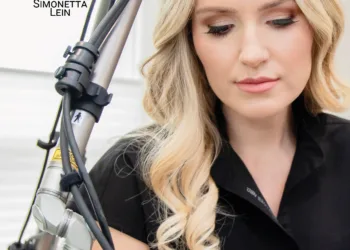In the fashion landscape of the 1990s, Ève Salvail defied conventional beauty norms with her androgynous appearance featuring a shaved head adorned with distinctive tattoos. Her unique style didn’t hinder her success; instead, it catapulted her onto runways and into campaigns for renowned fashion houses, including Jean-Paul Gaultier, Versace, and Karl Lagerfeld. Today, in her memoir titled «Sois toi et t’es belle» or «Be Yourself and You’re Beautiful,» she reflects on the highs and lows of her remarkable personal and professional journey.
Q: Your book delves into your various ‘identities.’ Who is the ‘authentic’ Ève Salvail today?
A: Today, I believe I’ve shed many of those masks and personas. Perhaps I’ve become a bit more spiritual, a bit more like the younger Ève. Sometimes, we continue to wear masks or adopt certain roles as a defense mechanism, even when they are no longer necessary. Today, my aim is simply to be myself.
Q: Your androgynous appearance made you stand out in the 1990s fashion scene. How do you explain your remarkable success despite being unconventional?
A: In 1992, my distinctive look felt quite «normal» to me; it was who I was, and I didn’t perceive myself as different from others. In hindsight, I realize I was the outlier. It was a different era. I was young and somewhat of a «punkette,» and it was quite surprising to me that I ended up walking the runway for some of the biggest names in fashion.
Q: Did your appearance invite criticism or negative feedback?
A: Not really. Interestingly, after getting my tattoo and just before my first Jean-Paul Gaultier show, my agencies dropped me. Apart from that, I was fortunate not to face any other negative repercussions.
Q: Were there pressures to conform to the standards of the industry at the time?
A: Not really. As I often say, fate may have played a significant role, but my uniqueness probably emerged at just the right moment. They accepted me as I was, with my shaved head and tattoos.
Q: You mention a significant moment during a fitting with Karl Lagerfeld when you decided never to show your emotions again. Is this emotional detachment crucial for success in the industry?
A: I would say, in about 80% of cases, yes. There are exceptions, of course, like Jean-Paul Gaultier and Christian Lacroix. However, more often than not, in this industry, which is rather short-lived, it’s vital to keep your emotions to yourself to endure.
Q: What role did Jean-Paul Gaultier play in your career?
A: Without Jean-Paul, there wouldn’t be a career! He set the starting point and direction for my career. I owe him a great deal, and I hold immense respect for that man.
Q: You also speak about your traumas and addictions. Were these linked to your career?
A: Yes, because without those substances, I might not have coped with the demands of my modeling career. However, substance abuse also took me to rock bottom. Addiction won, and I had to step back to learn how to love, laugh, and live healthily once more.
Q: Terms like «inclusivity,» «diversity,» and «self-empowerment» are prevalent today. Do you think the fashion industry has truly changed?
A: I haven’t kept up with the fashion world since my career, so I can’t judge its evolution. From what little I see on my Instagram feed, there seem to be curvier women, individuals from around the world, and men in high heels. But that’s just my Instagram!
Q: What was the pinnacle of your career?
A: It’s incredibly hard to choose! When I was at the height of my career, I couldn’t fully grasp the significance of what was happening. It was only in hindsight, when I reflected on those moments, that I began to understand the impact those years and that world had on me. Today, I am immensely grateful and even somewhat nostalgic for those magical years.
Q: And the low point?
A: The barriers I imposed on myself, the negative self-talk I engaged in. The worst didn’t come from external sources but from within.
Q: If you could go back almost 30 years to the beginning of your modeling career, would you change anything?
A: No. As tumultuous as it was, my career shaped me into the happy and fulfilled person I am today. With hindsight, I can honestly say that I wouldn’t change a thing.
Q: What message do you have for individuals continually striving to conform to the fashion industry’s dictates?
A: I’d tell them to stop trying, precisely that.

































